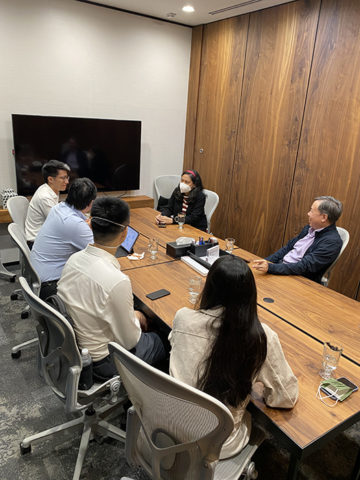Top Story
Up Close and Personal with Zheng Wanshi, Frasers Property Ltd
For the second instalment of the Up Close and Personal series, we caught up with Zheng Wanshi of Frasers Property Ltd
25 April 2022
Tan Yi-xun, YLG Committee Co-Chair
For the third instalment of the Up Close and Personal Series we spoke to Hugh Lim, Executive Director of the Centre for Liveable Cities. In a free-flowing discussion facilitated by ULI Singapore YLG Co-Chair Tan Yi-xun, Hugh drew from his rich experiences to cover topics ranging from career development and taking a leap into emerging industries, to urban planning challenges, learning from other cities and even hawker centres.
We kicked off the session with a question on career development, and how Hugh started working in the built environment sector. Hugh explained that he got into the sector due to a combination of both interest and opportunity; even though his past roles at the Singapore Armed Forces and the Ministry of Law as well as the Ministry of Community, Culture and Youth were not focused on the built environment, he picked up relevant experience in land planning and development projects that serve him well in the sector. More broadly, Hugh felt that for younger people in the built environment entering a brave new world, what is more important is the preparedness to switch, including exciting emerging industries such as virtual real estate for which there relevant past experience might not exist as nobody’s the wiser. What is important is drawing on transferable skills, having the courage to take a leap and the dexterity to learn on the job.

(1st from right) Hugh Lim in a closed-door dialogue with a few ULI Singapore student members
As for what Hugh looks out for in terms of recruitment of fresh graduates, there would be different expectations depending on the nature of the role. For an engineering job which requires hard skills then there would be a higher bar in terms of academic qualifications. For more general multi-disciplinary roles however he would look out for candidates who show a breadth of interest, drive and curiosity to go beyond what they learned in school. Projects and internships that candidates take up can be useful indicators.
The discussion then turned to Singapore’s approach to urban challenges and learning from other cities. Cities are at different stages of development and face different challenges, and hence there is no one-size-fits-all approach. That said, citing the quote “The future is already here – it’s just not very evenly distributed”, there can still be learning points if one looks hard enough. In Singapore, a recent example of a major shift in Singapore’s housing policy is the introduction of the Prime Location Public Housing model, which was partly driven by concerns over the potential formation of ethnic and/or immigrant enclaves seen in some other cities. An international example of the importance of learning from others is the 2019 Grenfell Tower fire – prior to the tragedy, there had been similar problems with flammable cladding in at least two other cities, Melbourne and Dubai.
The closing topic (perhaps because it was almost dinnertime!) was the apparent gentrification of hawker centres in Singapore serving more expensive dishes. Hugh stressed that the starting point was that the hawker centre would remain as a place for affordable food but over time, what is considered affordable might shift, and what consumers desire might also change. To some degree, the changes in hawker centre offerings reflect more diverse consumer demand. As for how best to balance preserving “heritage” dishes with new stalls catering to different tastes, Hugh felt that a large part of the heritage would remain in the hawker format of having affordable food in an open public setting, but the content of stall offerings within hawker centres would evolve over time.
We encourage students to join ULI and gain access to knowledge and peers as we work as a community to shape the future of the built environment for transformative impact in communities worldwide. To find out more, email [email protected]
ULI Singapore thanks The Executive Centre for hosting this dialogue.
Don’t have an account? Sign up for a ULI guest account.